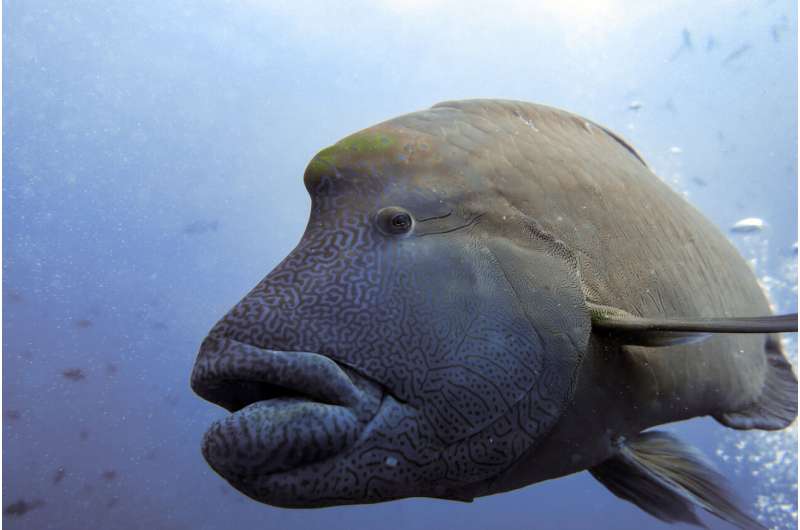This article has been reviewed according to Science X's editorial process and policies. Editors have highlighted the following attributes while ensuring the content's credibility:
fact-checked
peer-reviewed publication
proofread
Warming and overfishing could switch the role of fishes in the marine carbon cycle

Bony fish are more often recognized as food sources than as carbon regulators. They provide an array of services relevant to climate change mitigation. For instance, they store carbon within their bodies as they grow and export it to deep seas through their sinking feces and carcasses. But they also make carbonates from marine salts within their guts and excrete them at high rates. This makes them especially important within the inorganic carbon cycle of the oceans.
With plenty of fish in the sea, the importance of fish carbonates for the inorganic carbon cycle should not be underestimated. Fish carbonates can sink and become part of sediments or dissolve and increase the water's ability to neutralize acids. They could therefore enhance the ocean's capacity to buffer acidification. A new study in Nature Communications sheds light on the controls of carbonate excretion by fish. The findings advance our understanding of the biogeochemical and physical processes in the ocean in times of climate change.
Led by the Leibniz Center for Tropical Marine Research (ZMT), a team of scientists studied a wide variety of fish species to determine how certain fish characteristics and environmental changes control the amount and composition of excreted carbonates. The team retrieved carbonates produced by fish from Palau, Australia and the Bahamas while keeping them within aquaria in conditions natural to their home reef. The researchers then compiled an extensive database of carbonate excretion rates from more than 380 coral reef fishes from 85 species, including damselfish, surgeonfish, parrotfish, wrasses, snappers and groupers.
Why do bony fish excrete carbonates?
Marine fish live in a salty environment that has a higher osmotic pressure than their blood. As a result, their bodies are deprived of water. "To hydrate, the fish drink seawater, but they have to get rid of the large amounts of calcium and magnesium contained in it," explains Mattia Ghilardi, a marine biologist at the ZMT and lead author of the study. "These are precipitated in the gut in the form of carbonate crystals and released into the sea within the feces." Experts estimate that fish feces account for 3–15% of global carbonate production in ocean surface waters.
Unlike corals and other carbonate producers, fishes create a wide spectrum of carbonate forms. Depending on their composition, these crystals can dissolve rapidly in the water column, or sink and remain buried within shallow coastal sands for a long time, thus contributing to the formation of muddy sediments. Global warming and overfishing can alter the amount of carbonates produced by fishes, and ultimately dictate which carbonate form is excreted the most. This can tweak completely the role fish play in the ocean's inorganic carbon cycle.
It has long been assumed but not demonstrated that fish carbonate excretion is proportional to their metabolism. The scientists strongly confirmed this. High temperatures, for example, boost metabolism and carbonate excretion. Fish with forked or lance-shaped tails are more active and thus excrete more carbonates than fish with rounded tails. Interestingly, the length of the gut also plays a role: like temperature, it affects the amount and mineralogical composition of the excreted crystals.
Changes in marine chemistry possible
Global warming and the overfishing of certain fish species may significantly upset the contribution of fish carbonates to the marine inorganic carbon cycle. For example, fishing pressure on fish that are high up the food chain could lead to a sharp decline in carbonate excretion. Climate-driven changes in fish size may exacerbate this effect. Warmer temperatures favor the production of highly soluble fish carbonates that form less sediment. All of these factors influence marine chemistry and potentially the ocean's capacity to buffer further atmospheric CO2.
The new findings will enable researchers to more reliably calculate the amount and composition of carbonates produced by fish communities in different marine regions and worldwide. "With our study, we pave the way for more accurate predictions about the role of fish in the marine carbon cycle under changing conditions such as climate warming and overfishing," says co-author Sonia Bejarano, reef ecologist at the ZMT. "Such predictions are very important for management and decision-making processes aimed at maintaining ecosystem functions."
More information: Mattia Ghilardi et al, Temperature, species identity and morphological traits predict carbonate excretion and mineralogy in tropical reef fishes, Nature Communications (2023). DOI: 10.1038/s41467-023-36617-7
Journal information: Nature Communications
Provided by Leibniz-Zentrum für Marine Tropenforschung (ZMT)





















